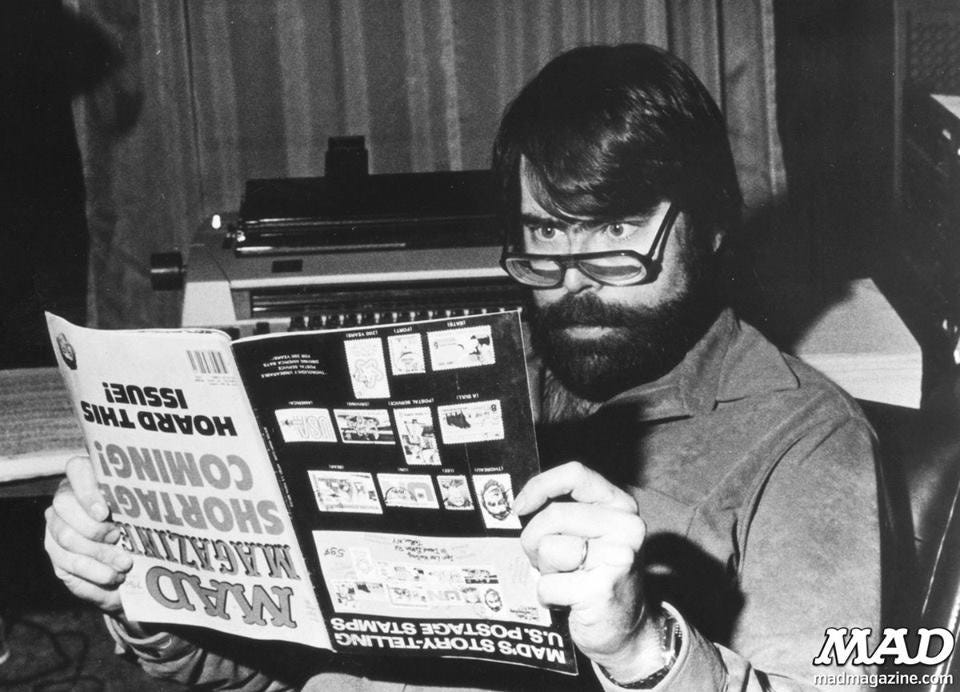Today’s short story receives such a bad rating, I had to revert back to Scriptshadow 1.0 to give it.
Genre: Apocalyptic/Drama
Premise: A college professor is annoyed by the death of a mid-level banker during the end of the world.
About: This is another Stephen King short story sale. It comes from the collection, “If it Bleeds.” It has Darren Aronofsky on board to produce (not direct). Two other stories from the collection have already been purchased. “Rat” by Ben Stiller and “Mr. Harrigan’s Phone” by John Lee Hancock.
Writer: Stephen King
Details: About 120 pages

It used to be that, when you talked about Stephen King, you talked about what a great writer he was. Nowadays, when you talk about King, it’s usually because of some spat he’s having with Elon Musk on Twitter.
It’s kind of sad. But it hasn’t affected his ability to sell his content Hollywood. Almost every King story that gets written, gets optioned. The man has the Midas touch. Then again, nobody has seen The Life of Chuck Yet. When they do, it could end King’s career…. for good.
Marty is an English professor at a small college in New England. He’s dealing with the deterioration of the internet, which only works sporadically these days. This is because the world’s infrastructure has been falling apart over the last year.
California has fallen into the Pacific Ocean. Florida is, basically, gooey swampland. Food shortages mean that In and Outs are closing down (not in King’s story, just my personal guess). It’s bad, man.
Amongst it all, Marty is mesmerized by the local bank’s billboards and commercials that keep popping up promoting Charles “Chuck” Krantz, who has just retired after giving the bank 39 great years. Or they’re congratulating him for his life and dying at 39 years old. The story is so shabbily written, it’s not clear which of those is the case. But the point is, there are ads everywhere celebrating Chuck Krantz’s contributions and Marty is annoyed by it.
We then find out that Chuck is on a respirator because of a brain tumor. And then he dies. This sends us into Act 2, nine months prior, where an ignorant-to-his-sickness Chuck dances. That’s right. The second act is a dance.
Chuck goes downtown to work, stops in front of some guys playing the drums on the street. He decides to dance. Everyone cheers. Some girl hops in and dances with him. The song ends. They bask in the post-glow excitement. Then they go back to their normal lives.
The final act sends us back even further into Chuck’s life when he was a kid where we basically watch him grow up. We hit all the low-points, like his parents and grand-parents dying – uplifting stuff – before a semi-adult Chuck walks solemnly around the house his grandfather left him. The end.
In an industry that has fully embraced the short story and given out huge monetary rewards for writing these stories, The Life of Chuck has thrown its hat into the ring to win the “worst short story ever” contest.
I’m not exaggerating when I say this may be the worst short story I’ve ever read.
It’s bizarre because you pick up a Stephen King story and you expect to be a) entertained and b) learn something about the craft. A) I was the opposite of entertained. What I went through could better be categorized as torture. And b) The only thing I learned is that Stephen King doesn’t care about writing good stories anymore.
The first act of the story starts off well. The internet is barely working. There’s word that California is falling into the ocean. End-of-the-world scenarios are movie catnip. We moviegoers love them. I love them. So I was intrigued to see where this was going.
Then King leans heavily into, basically, a PSA about the environment. It was as if the story stopped and King, the activist, transported himself in. I remember back when King used to talk about theme in writing. He would write the best story possible then, while rewriting it, he’d search for a theme and place more emphasis on it. These days, he seems to be starting with the theme. His stuff just doesn’t work nearly as well with that approach.
The irony is that the first act was still the best part of the The Life of Chuck. Because at least in the first act, things are happening. The world is falling apart.
The second act is about a middle-aged man dancing. That’s it! That’s what 50 pages are about. A man, Chuck, is walking to work, happens to spot a drummer, starts dancing, is joined by a random younger woman, and they dance while everyone cheers. And that’s the second act!!

If you’re waiting for a point to emerge, get in line. I would not be surprised if King wrote this 120 pages short story in half an hour. Cause there is no fore-thought put into it. There are no setups or payoffs. None of what happens before connects to what happens after. It’s random to the extreme.
Then, the final act – the part of your story that’s supposed to go out with a bang – is just backstory!!!! Long drawn-out boring backstory. Parents died in a car crash (wow, that’s original. I only read about 50 scripts a year that have a car crash backstory). Grandparents die one at a time. And, in between, Chuck sits around so that King can fill us in on whatever other pointless moments in Chuck’s life he can think of.
This is baaaaaad, guys.
I understand that King’s name has weight in the business. But did they read this story??????? Cause this is the worst thing he’s ever written. And you’re going to put it out there for people to see who are going to make fun of you for the next 25 years for it.
Actually, I take that back. This isn’t bad in a fun way where people make fun of it. It’s bad in a sad way. In that way where, the second you finish it, you’ve forgotten in. Nobody will remember this movie for more than three minutes.
There’s this moment in the story where Marty is going to visit his ex-wife, gets to her house at night, then proceeds to notice that every single window in every single house as far down as you can see, all contain a reflection of the “Thanks Chuck” billboard.
It is not explained to us why this happens. It is not explained to us how it happens. It’s as if King’s 10 year old grandson stumbled into the room while he was writing, mumbled, “window reflection” and King just wrote the moment into the book without missing a beat. I cannot emphasize how sloppy and random every choice in this story was.
The only logical reason I can come up with for why they bought this story would be the first act. The first act is all about the world falling apart. California falls into the ocean. The South is a dust bowl. Florida is a swampland. Sinkholes are everywhere. There is no longer enough farmland which means people start starving. Worst of all, the internet stops working.
All of that stuff is very cinematic. So maybe they’ll use that as a jumping-off point for a different story than the one that is told here. Because if they bring in Chuck Krantz, they are signing this movie’s death warrant. Chuck Krantz is the worst character in American history. He will depress you, he will bore you, he will make you never want to read again.
One of the tell-tale signs of bad writing is when the reader stops reading, stares off into space, looks back down at the book, and says to himself, “What is this about?” I must have done that two-dozen times.
Fiction has hit a new low-point. So much so that I’m bringing back a retro rating to rate this script.
[x] Trash
[ ] wasn’t for me
[ ] worth the read
[ ] impressive
[ ] genius
What I learned: Backstory is non-story. Part of me thinks King is trolling us by making his climax the least interesting part of any book – backstory. But by putting it on display at such a critical juncture, it highlights just how little payoff backstory provides. Unless you have some sort of extremely unique and interesting backstory or event your main character has gone through that is IMPERATIVE for the reader to know in order for your movie to work, avoid backstory like the plague. Throw it in there in little bits and pieces (Ferris Bueller to Cameron on the phone: “You’ve been saying that since the second grade.”). But, otherwise, avoid it like you would avoid this book.

